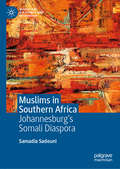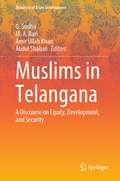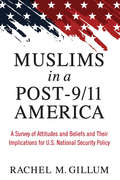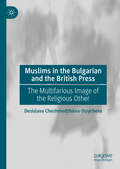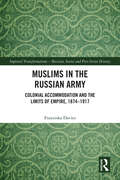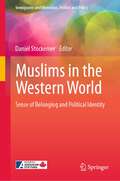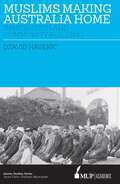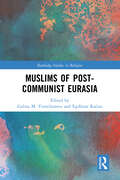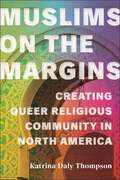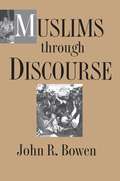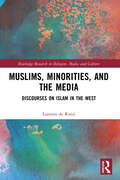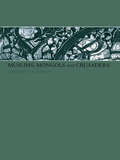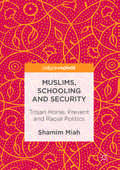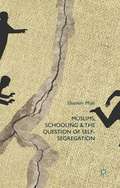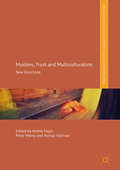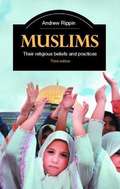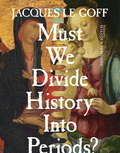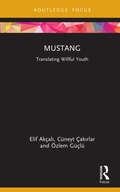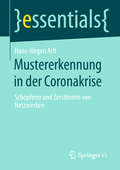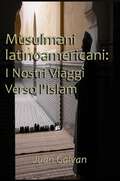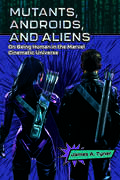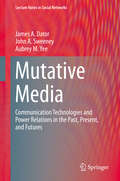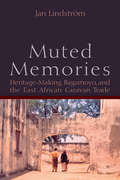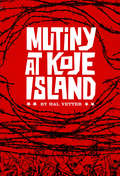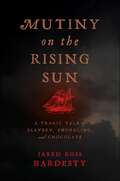- Table View
- List View
Muslims in Southern Africa: Johannesburg’s Somali Diaspora (Migration, Diasporas and Citizenship)
by Samadia SadouniThis book presents a socio-historical analysis of the Somali Muslim diaspora in Johannesburg and its impact on urban development in the context of Somali migrations in the Southern African Indian Ocean region from the end of the 19th Century to today. The author draws on a combination of archival and ethnographic research to examine the interlocking processes of migration, urban place-making, economic entrepreneurship and transnational mobility through the lens of religious practice and against the background of historical interactions between the Somali diaspora and the British and Ottoman Empires. Comparison with other Muslim diasporas in the region, primarily Indians, adds further depth to an investigation which will shed new light on the Somali experience of mobility and the urban development of South Africa across its colonial, apartheid and democratic periods. The politics of race, imperial and post-imperial identities, and religious community governance are shown to be key influencing factors on the Somali diaspora in Johannesburg. This sophisticated analysis will provide a valuable resource for students and scholars of urban geography, the sociology of religion, and African, race, ethnic and migration studies.
Muslims in Telangana: A Discourse on Equity, Development, and Security (Dynamics of Asian Development)
by Abdul Shaban G. Sudhir M. A. Bari Amir Ullah KhanThis book analyses the state of development of Muslims at the regional level. It explains the linkages between the findings of global, national, and state-level studies with regard to the current status of Muslims and broadens understanding of Muslims and their participation in virtually all major sectors, including the economy, housing, demography, health, migration, state policy, and affirmative action. The book presents the challenges faced by the community and reflects upon the socio-economic and educational conditions of Muslims in Telangana State. It presents a comparative analysis of mortality data, maternal health, delivery care, and child immunization, as well as reproductive health aspects and children’s nutritional status. It shares valuable insights into the impacts of emigration and internal migration on health among local Muslims and presents a detailed analysis of data from the Census of India, NSSO, and Commission of Inquiry on Socio-Economic and Educational Status of Muslims regarding the social, economic, and demographic situation of Muslims in Telangana, as well as their opportunities for development under the newly formed state government. The book would be of great interest to scholars and researchers in development economics, sociology, politics, history, cultural studies, minority studies, Islamic studies, and policy studies, as well as policymakers, civil society activists, and those working in media and journalism.
Muslims in a Post-9/11 America: A Survey of Attitudes and Beliefs and Their Implications for U.S. National Security Policy
by Rachel M GillumMuslims in a Post-9/11 America examines how public fears about Muslims in the United States compare with the reality of American Muslims’ attitudes on a range of relevant issues. While most research on Muslim Americans focuses on Arab Muslims, a quarter of the Muslim American population, Rachel Gillum includes perspectives of Muslims from various ethnic and national communities—from African Americans to those of Pakistani, Iranian, or Eastern European descent. Using interviews and one of the largest nationwide surveys of Muslim Americans to date, Gillum examines more than three generations of Muslim American immigrants to assess how segments of the Muslim American community are integrating into the U.S. social fabric, and how they respond to post-9/11 policy changes. Gillum’s findings challenge perceptions of Muslims as a homogeneous, isolated, un-American, and potentially violent segment of the U.S. population. Despite these realities, negative political rhetoric around Muslim Americans persists. The findings suggest that the policies designed to keep America safe from terrorist attacks may have eroded one of law enforcement’s greatest assets in the fight against violent extremism—a relationship of trust and goodwill between the Muslim American community and the U.S. government. Gillum argues for policies and law enforcement tactics that will bring nuanced understandings of this diverse category of Americans and build trust, rather than alienate Muslim communities.
Muslims in the Bulgarian and the British Press: The Multifarious Image of the Religious Other
by Desislava Cheshmedzhieva-StoychevaThis book compares the ways in which the national media in two different countries construct (frame) and develop the image of the religious other, in this case Muslims in all their variety. Although it introduces concepts such as race and racism, otherness, Orientalism and Islamophobia, which may be familiar to the majority of readers, in this manuscript they serve the purpose of a comparative analysis which has not been done on the subject to date. The manuscript analyzes the thematic distribution of the articles, as well as the definitions, metaphors and stereotypes used, thus presenting a complete and diverse image of Muslims along with the similarities and differences in the thinking patterns employed by Bulgarians and British on the subject and expressed in the respective mainstream media. In this respect the manuscript fills a void in the scholarly literature on the ways the media discourses in two very different countries present the image of a religious group. Here we can even talk about the existing divide between East and West and the changing perception of the religious Other fostered by the general digitalization and free flow of information. As English is an international language it undeniably makes access to information easier, however, there are not many culture specific studies presenting the current state of a problem or the analyses on that particular topic (the image of Muslims) in that international medium. Therefore, the manuscript aims at introducing English speaking scholars, students, media people, and generally everyone interested in the topic, to the Bulgarian way of seeing, depicting and talking about Muslims. As stated above, the manuscript draws parallels between the language used by the Bulgarian and the British media, thus providing a similar starting point as the majority of the potential readers are probably more familiar with the latter. In addition, scholars working extensively with other local cultures and/or media and resorting to English as a medium for the popularization of their research, can use the presented analytical frame to their specific analyses and contribute even further to the enrichment of the global data base on the topic.
Muslims in the Russian Army: Colonial Accommodation and the Limits of Empire, 1874 –1917 (Imperial Transformations – Russian, Soviet and Post-Soviet History)
by Franziska DaviesMuslims in the Russian Army is the first comprehensive account of the tsarist army’s relationship to Muslim soldiers in late imperial Russia.When Russia mobilized her army in the summer of 1914 more than half a million of the soldiers recruited for the front were Muslims from the Volga-Ural region, that is present-day Tatarstan and Bashkortostan. They were the only ones among the millions of Muslim subjects of the tsar who were recruited into the regular army, despite the fact that universal liability to military service had been introduced in the Russian Empire in 1874. However, in practice, special regulations had been adopted for the Crimean Tatars, while the Muslim subjects of Central Asia and the Caucasus remained exempted, revealing the limited ability of the imperial state to extend the “Great Reforms” under Alexander II to its colonial peripheries. The book highlights the empire’s policies of accommodating the religious needs of Muslim soldiers in the army but argues that this should be understood as a form of colonial accommodation and not as an embrace of tolerance as has been done before. By not only reconstructing the perspectives of military and bureaucratic elites and the Muslim intelligentsia but also considering accounts written by Muslim soldiers, this book includes the voices of the colonized whose stories are still too often ignored in the historiography of the Russian Empire.This book is a valuable contribution to three much-debated fields of imperial and colonial history: the accommodation of religious and ethnic diversity, the impact of the state’s modernization projects, and the perception of imperial institutions by non-Russian subjects. It will be of interest to researchers in European History, Modern History, Military and Naval History, and Central Asian, Russian, and Eastern European Studies.
Muslims in the Western World: Sense of Belonging and Political Identity (Immigrants and Minorities, Politics and Policy)
by Daniel StockemerThis book provides an overview of the identity and sense of belonging of Muslims in the Western world. By presenting case studies on European countries such as France, the Netherlands and the UK, as well as the USA and Canada, it offers a comparative perspective on how Muslims feel toward and are integrated in their country of residence. The respective contributions examine the sense of belonging and identity of Muslims and compare their levels of integration. Furthermore, they discuss the compatibility of their religious beliefs and values with the political and democratic order of their country of residence, and make concrete policy recommendations. The book is chiefly intended for scholars of political science and migration studies who are seeking a comparative perspective on the status quo of Muslims’ integration in the Western world.
Muslims making Australia home: Immigration and Community Building
by Dzavid HavericThe story of Islam and the Muslim people is an integral part of Australian history. This book covers the period from post-World War II until the 1980s when the history of Islam in Australia unfolded into a rich multi-ethnicity, manifested by diverse Muslim ethnic groups. Muslim migrants found Islam in Australia more pluralistic than they found possible in their homeland, because in Australia they met fellow Muslims from many different ethnic, racial, cultural, sectarian and linguistic backgrounds. Muslims are an integral part of Australia's social fabric and multicultural way of life, shaping their Muslimness in an Australian context and their Australianness from Muslim viewpoints and experiences. Documenting socio-historical characteristics rather than providing a theological interpretation, Muslims Making Australia Home covers interrelated Islamic themes in the sociology of religion by noting how these themes reappear in cultural history. The book reveals many unknown or little-known historical facts, stories and valuable memories. Islamic Studies Series - Volume 28
Muslims of Post-Communist Eurasia (Routledge Studies in Religion)
by Egdūnas Račius Galina M. YemelianovaThis book discusses the evolution of state governance of Islam and the nature and forms of local Muslims’ rediscovery of their ‘Muslimness’ across post-communist Eurasia. It examines the effects on the Islamic scene of the political and ideological divergence of Central and South-Eastern Europe from Russia and most of the Caucasus and Central Asia. Of particular interest are the implications of the proliferation of new, ‘global’ interpretations of Islam and their relationship with existing ‘traditional’ Islamic beliefs and practices. The contributions in this book address these issues through an interdisciplinary prism combining history, religious studies/theology, social anthropology, sociology, ethnology and political science. They analyse the greater public presence of Islam in constitutionally secular contexts and offer a critique of the domestication and accommodation of Islam in Europe, comparing these to what has happened in the international Eurasian space. The discussion is informed by the works of such thinkers as Talal Asad, Bryan Turner, Veit Bader, Marcel Maussen and Bassam Tibi, and utilises primary and secondary sources and ethnographic observation. Looking at how collectivities and individuals are defining what it means to be Muslim in a globalised Islamic context, this book will be of great interest to scholars of Religious Studies, Islamic Studies, Political Science, Sociology and Anthropology.
Muslims on the Margins: Creating Queer Religious Community in North America (North American Religions)
by Katrina Daly ThompsonOffers vivid stories of nonconformist Muslim communitiesThe turn of the twenty-first century ushered in a wave of progressive Muslims, whose modern interpretations and practices transformed the public’s perception of who could follow the teachings of Islam. Muslims on the Margins tells the story of their even more radical descendants: nonconformists who have reinterpreted their religion and created space for queer, trans, and nonbinary identities within Islam.Katrina Daly Thompson draws extensively from conversations and interviews conducted both in person in North America and online in several international communities. Writing in a compelling narrative style that centers the real experiences and diverse perspectives of nonconformist Muslims, Thompson illustrates how these radical Muslims are forming a community dedicated to creative reinterpretations of their religion, critical questioning of established norms, expansive inclusion of those who are queer in various ways, and the creation of different religious futures. Muslims on the Margins is a powerful account of how Muslims are forging new traditions and setting precedents for a more inclusive community— one that is engaged with tradition, but not beholden to it.
Muslims through Discourse: Religion and Ritual in Gayo Society
by John R. BowenIn this rich account of a Muslim society in highland Sumatra, Indonesia, John Bowen describes how men and women debate among themselves ideas of what Islam is and should be--as it pertains to all areas of their lives, from work to worship. Whereas many previous anthropological studies have concentrated on the purely local aspects of culture, this book captures and analyzes the tension between the local and universal in everyday life. Current religious differences among the Gayo stem from debates between "traditionalist" and "modernist" scholars that began in the 1930s, and reveal themselves in the ways Gayo discuss and perform worship, sacrifice, healing, and rites of birth and death, all within an Islamic framework. Bowen considers the power these debates accord to language, especially in arguments over spells, rites of farming, hunting, and healing. Moreover, he traces in these debates a general conception of transacting with spirits that has shaped Gayo practices of sacrifice, worship, and aiding the dead. Bowen concludes by examining the development of competing religious ideas in the highlands, the alternative ritual forms and ideas they have pro-mulgated, and the implications of this phenomenon for the emergence of an Islamic public sphere.
Muslims, Minorities, and the Media: Discourses on Islam in the West (Routledge Research in Religion, Media and Culture)
by Laurens de RooijInspired by overtly negative coverage by the Western mainstream press of Muslims in particular, and minorities in general, this book asks: Why are negative narratives and depictions of Muslims and other minorities so hard to change? News reports about Islam and Muslims commonly relate stories that discuss terrorism, violence or other unwelcome or irrational behaviour, or the lack of integration and compatibility of Muslims and Islam with Western values and society. Yet there is little research done on how studies on media reports about minorities seemingly fail to improve the situation. Combining empirical research with a structural analysis of the media industry, this volume presents evidence for the maligned representation of minorities by media corporations, analysing why negative narratives persist and outlining how these can be effectively transformed. It is an outstanding resource for students and scholars of media, religion, culture, sociology, and Islamic studies, and is also of benefit for journalists, media representatives, and activists looking to effect change for minority representation in the media industry specifically or in society at large.
Muslims, Mongols and Crusaders: An Anthology Of Articles Published In The Bulletin Of The School Of Oriental And African Studies
by G. R. HawtingThe period from about 1100 to 1350 in the Middle East was marked by continued interaction between the local Muslim rulers and two groups of non-Muslim invaders: the Frankish crusaders from Western Europe and the Mongols from northeastern Asia. In deflecting the threat those invaders presented, a major role was played by the Mamluk state which arose in Egypt and Syria in 1250. The Bulletin of the School of Oriental and African Studies has, from 1917 onwards, published several articles pertaining to the history of this period by leading historians of the region, and this volume reprints some of the most important and interesting of them for the convenience of students and scholars.
Muslims, Schooling and Security: Trojan Horse, Prevent and Racial Politics
by Shamim MiahThis book focuses on the recent educational policy debates surrounding Muslims, schooling and the question of security in light of the Counter Terrorism Security Act – which has made ‘Prevent’ a legal duty for schools, colleges and universities. The book examines the infamous ‘Trojan Horse’ affair in Birmingham, and critically evaluates the security discourses in light of theoretical insights from the study of racial politics. The sociology of race and schooling in the UK has long been associated with a number of diverse areas of study, including racial inequality, multiculturalism, citizenship and identity; however, until very recently, very little attention has been given to securitization and race within the context of education and even less focus has been given to the links between the question of security and racial politics. This book makes a much-needed and timely contribution to debates on the complex relationship between racial politics and schooling, and will make compelling reading for students and researchers in the fields of education and sociology, as well as education policy makers.
Muslims, Schooling and the Question of Self-Segregation
by Shamim Miah'Integration' or the supposed lack of it by British Muslims has been a ubiquitous feature in political, media and policy discourses over the past decades, often with little or no evidence base. This book is particularly timely as it draws on empirical research amongst both Muslim school students and parents to examine the question of 'self-segregation' in the light of key policy developments around 'race', faith and citizenship. It aims to contribute towards a national debate on segregation, schooling and Muslims in Britain through deconstructing the received wisdom of 'Muslim separateness'.
Muslims, Trust and Multiculturalism: New Directions (Palgrave Politics Of Identity And Citizenship)
by Peter Morey Asmaa Soliman Amina YaqinThis book critically engages with the contemporary breakdown of trust between Muslim and non-Muslim communities in the West. It argues that a crisis of trust currently hampers intercultural relations and obstructs full participation in citizenship and civil society for those who fall prey to the suspicions of the state and their fellow citizens. This crisis of trust presents a challenge to the plurality of modern societies where religious identities have come to demand an equal recognition and political accommodation which is not consistently awarded across Europe, especially in nations which view themselves as secular, or where Islamic culture is seen as alien. This volume of interdisciplinary essays by leading scholars explores the theme of trust and multiculturalism across a range of perspectives, employing insights from political science, sociology, literature, ethnography and cultural studies. It provides an urgent critical response to the challenging contexts of multiculturalism for Muslims in both Europe and the USA. Taken together, the contributions suggest that the institutionalisation of multiculturalism as a state-led vehicle for tolerance and integration requires a certain type of trustworthy ‘performance’ from minority groups, particularly Muslims. Even when this performance is forthcoming, existing discourses of integration and underlying patterns of mistrust can contribute to Muslim alienation on the one hand, and rising Islamophobia on the other.
Muslims: Their Religious Beliefs and Practices (3rd edition)
by Andrew RippinThis concise and authoritative guide provides a complete survey of Islamic history and thought from its formative period to the present day. It examines the unique elements that have combined to form Islam, in particular the Qu'ran and the influence of Muhammad, and traces the ways in which these sources have interacted historically to create Muslim theology and law, as well as the alternative visions of Islam found in Shi'ism and Sufism. The improved and expanded third edition now contains brand new sections on twenty-first century developments, from the Taliban to Jihad and Al-Qaeda, and includes updated references throughout.
Must We Divide History Into Periods? (European Perspectives: A Series in Social Thought and Cultural Criticism)
by Jacques Le GoffWe have long thought of the Renaissance as a luminous era that marked a decisive break with the past, but the idea of the Renaissance as a distinct period arose only during the nineteenth century. Though the view of the Middle Ages as a dark age of unreason has softened somewhat, we still locate the advent of modern rationality in the Italian thought and culture of the fifteenth and sixteenth centuries. Jacques Le Goff pleads for a strikingly different view. In this, his last book, he argues persuasively that many of the innovations we associate with the Renaissance have medieval roots, and that many of the most deplorable aspects of medieval society continued to flourish during the Renaissance. We should instead view Western civilization as undergoing several "renaissances" following the fall of Rome, over the course of a long Middle Ages that lasted until the mid-eighteenth century. While it is indeed necessary to divide history into periods, Le Goff maintains, the meaningful continuities of human development only become clear when historians adopt a long perspective. Genuine revolutions—the shifts that signal the end of one period and the beginning of the next—are much rarer than we think.
Mustang: Translating Willful Youth (Cinema and Youth Cultures)
by Elif Akçalı Cüneyt Çakırlar Özlem GüçlüThis book provides a critically informed account of the Turkey-born France-based director Deniz Gamze Ergüven’s debut film Mustang (2015), which tells the story of five orphaned sisters living with their grandmother and uncle in a remote Turkish village. The film’s familiar art-house style, and its universalising focus on female coming-of-age and feminist dissent, resulted in celebratory reviews from journalists and scholars of world cinema. Meanwhile, Mustang’s framing of youth in the Turkish national context, and its representation of gender, divided Turkish film critics and cultural theorists. These divisions led to a debate that questions the politics of transnational feminism by criticising the film’s failure to capture the local intricacies of the politics of gender and youth. While this book aims to locate Mustang within the intersection of emerging female and youth narratives in the cinema of Turkey, it also provides a critical understanding of the differences in Mustang’s local and global reception. This focus on the geopolitics of representation informs the diverse criteria this study uses to evaluate Ergüven’s stylistic choices. Engaging with both Anglophone and Turkish literature in youth cinema and gender studies, the book makes an original contribution to current debates on national/transnational cinemas and gender/youth studies and is an accessible reference for graduate and undergraduate study of contemporary film. Elif Akçalı is Associate Professor in Film and TV Studies at Kadir Has University, Turkey. Her research focuses on film aesthetics, videographic criticism, non-fiction film, and gender/sexuality studies.
Mustererkennung in der Coronakrise: Schöpferin und Zerstörerin von Netzwerken (essentials)
by Hans-Jürgen ArltMitten im digitalen Fortschritt grätscht die Natur dazwischen. Von der Coronakrise lässt sich die Moderne nicht aufhalten auf ihrem Weg in die Computergesellschaft. Aber sie gerät unter verschärfte Beobachtung. Die Massenmedien legen den Sinnschleier der Krise über den öffentlichen Disput. Die Politik zeigt in der Funktion der Risikomanagerin, was sie (nicht) kann. Die Wirtschaft kämpft darum, den Status als Primus des Alltags zurückzugewinnen. Organisationen und Personen machen die klassische Krisenerfahrung, dass Schwache für Opferrollen prädestiniert sind. Spricht etwas dafür, dass die moderne Steigerungslogik von Nachhaltigkeit abgelöst, Konkurrenzdynamik von Kollaboration zivilisiert, Kommerzialisierung von Solidarität begrenzt wird? Das Essential entwickelt eine eigene Perspektive auf Phänomene und Potentiale.
Musulmani latinoamericani: I Nostri Viaggi Verso l'Islam
by Juan Galvan“Questo libro vi farà piangere, ridere, meditare, sentire il potere e la pace. È un'eccellente introduzione di modelli di ruolo per una giovane generazione di Musulmani”. - Camilla Stein “Ecco un libro che vi riempirà le orecchie di un coro di voci che forse non avevate mai sentito così chiaramente. Ciò che amo di questa ampia raccolta di saggi di testimonianza, accuratamente introdotta, è la sua varietà, la sua inquietudine, la sua apertura, la sua gamma”. - Michael Wolfe, autore di The Hadj: An American's Pilgrimage to Mecca. Scoprite un'interessante raccolta di storie profonde sui viaggi personali delle persone verso l'Islam. All'interno di questo libro, scoprirete una raccolta di storie forti e personali sul viaggio di tutti i giorni dei latinoamericani verso la verità. Racconta le loro lotte, le loro scoperte e le loro rivelazioni durante questo viaggio spesso lungo e faticoso, raccontato con cruda emozione e onestà, che si conclude con l'accettazione finale della loro pace nell'Islam. Mentre alcuni racconti sono di amore e accettazione, pieni della positività di una famiglia solidale, altri sono segnati da angoscia e conflitto, mentre l'autore si scontra con la sua nuova fede e il suo posto nel mondo. Con riflessioni approfondite sull'Islam e sulla comunità latinoamericana, oltre a una grande quantità di informazioni sul Corano e sulla fede Islamica stessa, questo libro è uno sguardo aperto e onesto sulla vita dei musulmani latinoamericani e su come la loro fede li ha plasmati.
Mutants, Androids, and Aliens: On Being Human in the Marvel Cinematic Universe
by James A. TynerIn both literature and film, mutants, androids, and aliens have long functioned as humanity’s Other—nonhuman bodies serving as surrogates to explore humanity’s prejudice, bigotry, and hatred. Scholars working in fields of feminism, ethnic studies, queer studies, and disability studies, among others, have deconstructed representations of the Othered body and the ways these fictional depictions provide insight into the contested terrains of identity, subjectivity, and personhood. In science fiction more broadly and the superhero genre in particular, the fictional Other—often a superhero or a villain—is juxtaposed against the normal human, and such Others have long been the subject of academic investigation. Author James A. Tyner shifts this scholarly focus to consider the ordinary humans who ally with or oppose Othered superheroes. Law enforcement officers, military officials, politicians, and the countless, nameless civilians are all examples of humans who try to make sense of a rapidly changing more-than-human and other-than-human universe. The resulting volume, Mutants, Androids, and Aliens: On Being Human in the Marvel Cinematic Universe, provides a critical posthumanist reading of being human in the Marvel Cinematic Universe (MCU). Centering the MCU’s secondary human characters, including Matthew Ellis, Ellen Nadeer, Rosalind Price, as well as Jimmy Woo, Sadie Deever, Holden Radcliffe, and others, Tyner considers how these characters attempt to monitor, incarcerate, or exterminate those beings considered "unnatural" and thus threatening. Placing into conversation posthumanism, environmental ethics, and myriad philosophical and biological ontologies of life and death, Tyner maintains that the superhero genre reflects the current complexities of meaningful life—and of what happens in society when "the human" is no longer the unquestioned normative standard.
Mutative Media
by James A. Dator John A. Sweeney Aubrey M. YeeMutative Media is a sweeping examination of how communication technologies have contributed to changes in people's thoughts and actions, and thus in the power structures of societies, in the past, at present, and in four alternative futures. We start by surveying what is generally known about the emergence of human language and speech that has enabled humans to extend their organizing abilities beyond that of other hominids. We then review research on the emergence of signs, symbols, and eventually writing, which led to new ways of thinking, acting, and organizing in scribal societies and vastly extended human influence globally. We consider the impact of the printing press in Europe, the Middle East, China, and Korea that led to various ways of thinking and organizing in modern societies, and conclude our historical survey with a discussion of the emergence and impact of electric and electronic communication technologies from the nineteenth century to the present. After a brief overview of what "futures studies" is and is not, based on our extensive experience in the field, we present four generic alternative futures, and discuss a prototype of a hybrid, mixed-reality game designed to enable players to experience the power and potential of new communication technologies within four very different environments and conditions. We think you will be intrigued by our surprising findings and what they may mean for future generations!
Muted Memories: Heritage-Making, Bagamoyo, and the East African Caravan Trade
by Jan LindströmIn the late nineteenth century, tens of thousands of porters carried ivory every year from the African interior to Bagamoyo, a port town at the Indian Ocean. In the opposite direction, they carried millions of meters of cloth, manufactured in the USA, Europe, and India. This book examines the centrality of the caravan trade, both culturally and economically, to Bagamoyo’s development and cosmopolitan character, while also exploring how this history was silenced when Bagamoyo was instead branded as a slave route town in 2006 in an attempt to qualify it for the UNESCO World Heritage List.
Mutiny at Koje Island
by Hal VetterThis absolutely authentic, horrifying account of treachery, intrigue and ruthless brutality among 150,000 Communist POWs herded together on the small rugged island of Koje-do in Korea, tells of their holding the American commander as hostage and of their ultimate vicious mutiny, armed with thousands of improvised spears, gasoline grenades, and knives, and with countless barbed-wire flails.This is a now-it-can-be-told book that no American can read without becoming shocked and fighting mad. On the other hand no American can read the transcripts of the proceedings at Panmunjom without a deep feeling of respect and admiration for the distinguished military leaders of the United Nations to whom our national honor was entrusted. Their dignity, patience, and forbearance in the performance of a bleak, unrewarding task deserve the commendation of each and every citizen of the free world community.
Mutiny on the Rising Sun: A Tragic Tale of Slavery, Smuggling, and Chocolate
by Jared Ross HardestyA little-known story of mutiny and murder illustrating the centrality of smuggling and slavery in early American societyOn the night of June 1, 1743, terror struck the schooner Rising Sun. After completing a routine smuggling voyage where the crew sold enslaved Africans in exchange for chocolate, sugar, and coffee in the Dutch colony of Suriname, the ship traveled eastward along the South American coast. Believing there was an opportunity to steal the lucrative cargo and make a new life for themselves, three sailors snuck below deck, murdered four people, and seized control of the vessel.Mutiny on the Rising Sun recounts the origins, events, and eventual fate of the Rising Sun’s final smuggling voyage in vivid detail. Starting from that horrible night in June 1743, it narrates a deeply human history of smuggling, providing an incredible story of those caught in the webs spun by illicit commerce. The case generated a rich documentary record that illuminates an international chocolate smuggling ring, the lives of the crew and mutineers, and the harrowing experience of the enslaved people trafficked by the Rising Sun. Smuggling stood at the center of the lives of everyone involved with the business of the schooner. Larger forces, such as imperial trade restrictions, created the conditions for smuggling, but individual actors, often driven by raw ambition and with little regard for the consequences of their actions, designed, refined, and perpetuated this illicit commerce. At once startling and captivating, Mutiny on the Rising Sun shows how illegal trade created demand for exotic products like chocolate, and how slavery and smuggling were integral to the development of American capitalism.
